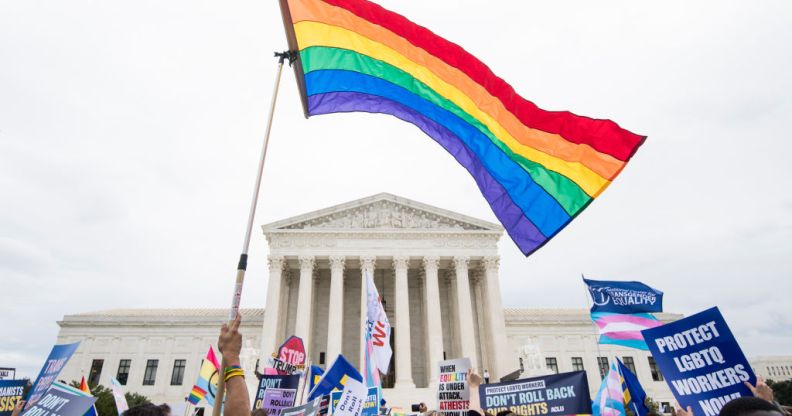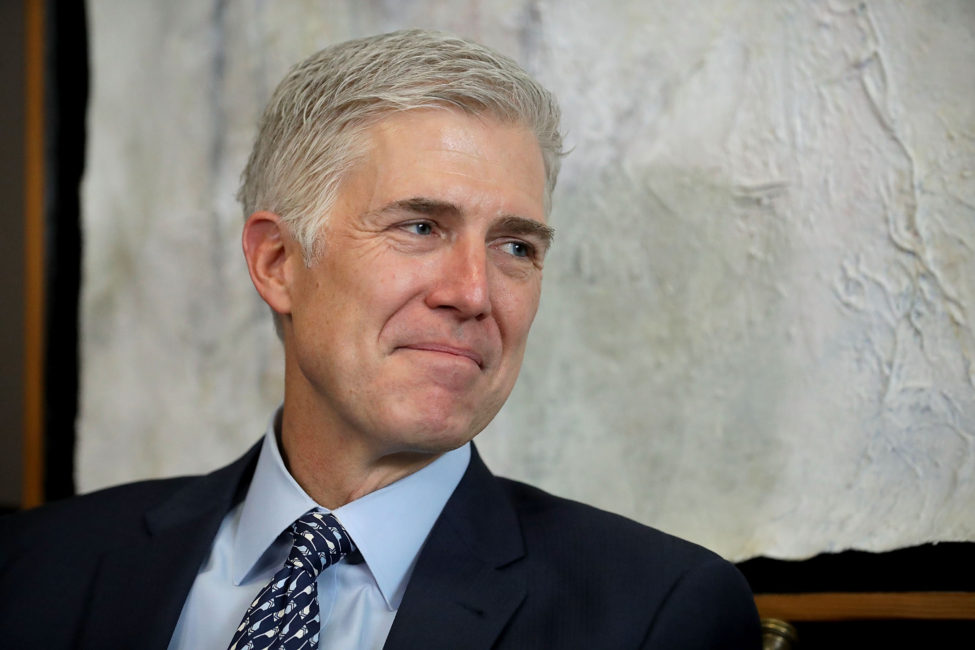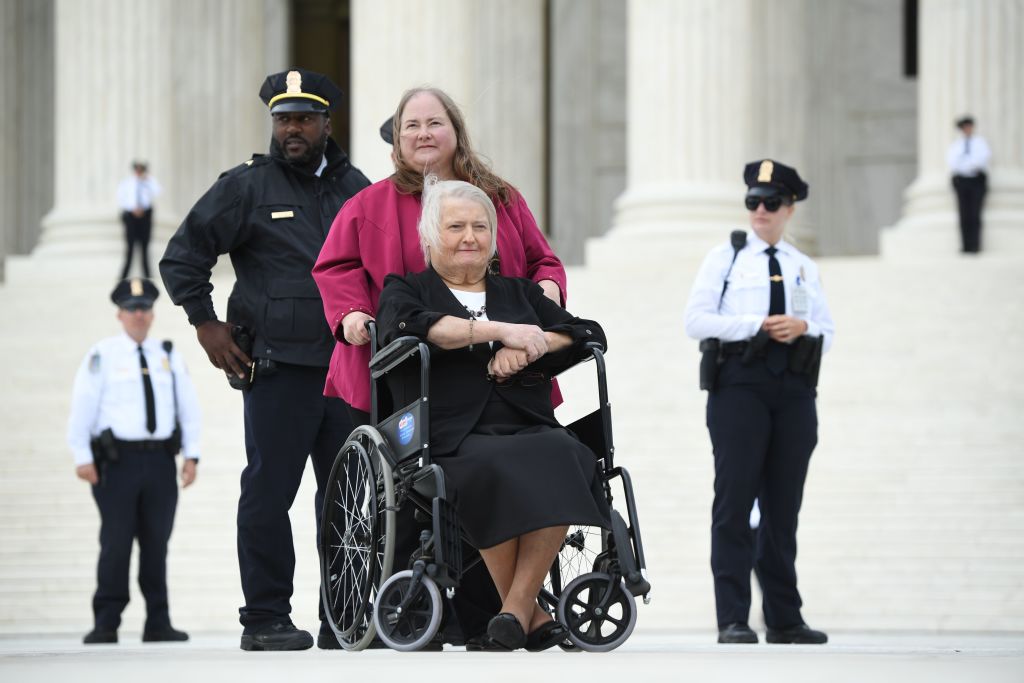Historic Supreme Court ruling says employers can’t fire people for being LGBT+ in stunning blow to Donald Trump

LGBT+ activists rally in front of the Supreme Court in October 2019 (Photo By Bill Clark/CQ-Roll Call, Inc via Getty Images)
The US Supreme Court has ruled that LGBT+ people are entitled to protection from discrimination based on their sexual orientation and gender identity, in a landmark ruling.
The court ruled that existing provisions under the 1964 Civil Rights Act, which outlaw discrimination based on sex, also apply to cases where “an employer fires an individual merely for being gay or transgender”.
The ruling extends the sex-based employment discrimination protections known as Title VII to LGBT+ people in all 50 states – a significant step, as equality measures to do so have long stalled by Republicans in Congress.
US Supreme Court: ‘Discriminating against LGBT+ people is discriminating based on sex.’
Penning the court’s opinion in the 6-3 ruling, conservative justice Neil Gorsuch wrote: “It is impossible to discriminate against a person for being homosexual or transgender without discriminating against that individual based on sex.
“Consider, for example, an employer with two employees, both of whom are attracted to men. The two individuals are, to the employer’s mind, materially identical in all respects, except that one is a man and the other a woman.
“If the employer fires the male employee for no reason other than the fact he is attracted to men, the employer discriminates against him for traits or actions it tolerates in his female colleague.
“Or take an employer who fires a transgender person who was identified as a male at birth but who now identifies as a female. If the employer retains an otherwise identical employee who was identified as female at birth, the employer intentionally penalises a person identified as male at birth for traits or actions that it tolerates in an employee identified as female at birth.
“Again, the individual employee’s sex plays an unmistakable and impermissible role in the discharge decision.”

Conservative justice Neil Gorsuch sided with the liberals in the ruling (Photo by Chip Somodevilla/Getty Images)
The ruling continues: “In Title VII, Congress adopted broad language making it illegal for an employer to rely on an employee’s sex when deciding to fire that employee.
“We do not hesitate to recognise today a necessary consequence of that legislative choice: An employer who fires an individual merely for being gay or transgender defies the law. ”
Gorsuch and chief justice John Roberts joined with liberals Ruth Bader Ginsburg, Stephen Breyer, Sonia Sotomayor and Elena Kagan to deliver the opinion, with just Clarence Thomas, Samuel Alito and Trump appointee Brett Kavanaugh dissenting.
The ruling goes against the wishes of the Trump administration, which had intervened in the case to argue that the Civil Rights Act does not apply to LGBT+ people.
Trump’s Department of Justice had sought to assert that the Title VII provisions should only apply based on the “ordinary meaning of sex” as male or female, not covering sexual orientation or gender identity.
Fired for being LGBT+, plaintiffs have had a long fight for justice.
The case, Bostock v Clayton County, was brought on behalf of three plaintiffs, all discriminated against for being LGBT+.
Lead plaintiff Gerald Bostock was employed as a child welfare worker in Clayton County, Georgia, when he was fired for being gay.
Tragically, the two other named plaintiffs in the case have died since their long-running legal actions began – with their families carrying on the fight for justice on their behalf.
Aimee Stephens, who passed away a month ago, was fired from the Michigan funeral home where she had worked for six years after coming out as transgender.

Transgender activist Aimee Stephens, with her wife Donna Stephens behind, sits in her wheelchair outside the US Supreme Court in Washington, DC, October 8, 2019 (Photo by SAUL LOEB/AFP via Getty Images)
Donald Zarda, who was fired from his job as a skydiving instructor because he is gay, died in 2014.
Before her death, Aimee Stephens left a message with her legal team at the ACLU to be shared if the court ruled in her favour.
In it, she said: “Firing me because I’m transgender was discrimination, plain and simple, and I am glad the Court recognised that what happened to me is wrong and illegal. I am thankful that the Court said my transgender siblings and I have a place in our laws — it made me feel safer and more included in society.”
Her widow Donna Stephens said: “For the last seven years of Aimee’s life, she rose as a leader who fought against discrimination against transgender people, starting when she was fired for coming out as a woman, despite her recent promotion at the time. I am grateful for this victory to honour the legacy of Aimee, and to ensure people are treated fairly regardless of their sexual orientation or gender identity.”
Melissa Zarda, brother of Donald Zarda, said: “My brother Don was my rock, my everything. I stood in the Supreme Court to honour his memory and to continue the fight for fairness. What happened to Don was wrong. People in our country already knew this, and now there is no question.”
James Esseks of the ACLU said: “This is a huge victory for LGBTQ equality. Over 50 years ago, Black and Brown trans women, drag queens, and butch lesbians fought back against police brutality and discrimination that too many LGBTQ people still face.
“The Supreme Court’s clarification that it’s unlawful to fire people because they’re LGBTQ is the result of decades of advocates fighting for our rights. The court has caught up to the majority of our country, which already knows that discriminating against LGBTQ people is both unfair and against the law.”
Supreme Court has been a key avenue for progress on LGBT+ rights
The Supreme Court’s landmark ruling is the latest in a string of advancements afforded to LGBT+ people by the court.
In 2003, the court struck down the last remaining state laws banning gay sex in Lawrence v. Texas.
A decade later in 2013, its ruling in United States v Windsor gutted the Defense of Marriage Act, which had barred the federal recognition of same-sex marriages.
It revisited the issue of same-sex marriage in 2015, with Obergefell v Hodges extending the right to marry a same-sex people to all 50 US states.
However, the court has also delivered less favourable rulings when it comes to conflicts between LGBT+ rights and religious liberty – most notably siding with anti-LGBT baker Jack Phillips in 2018 after he claimed the right to refuse to bake a wedding cake for a gay couple.

